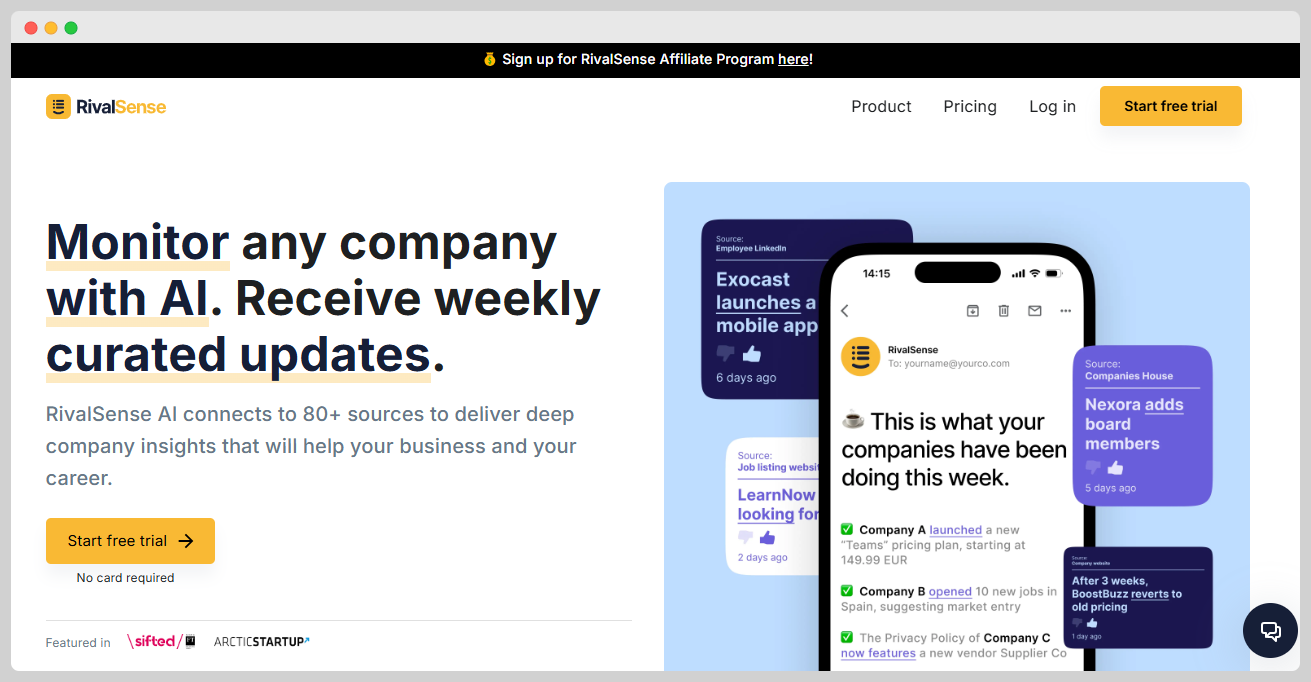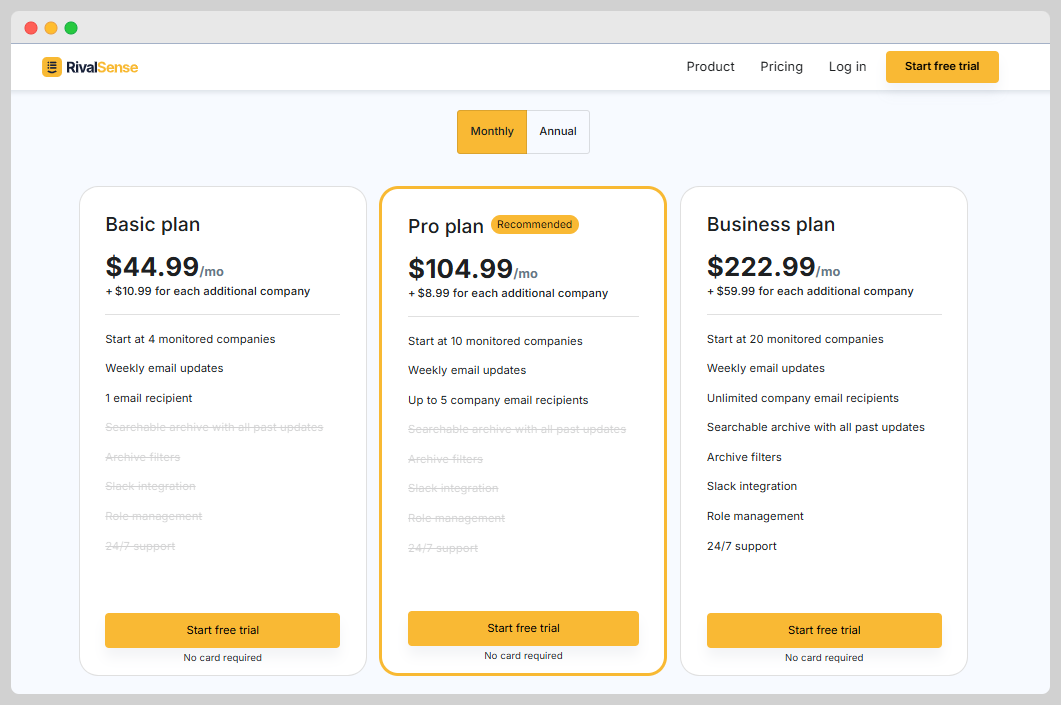How Martins Vaivars Grew RivalSense to 100 Clients in 48 Hours
Who is Martins Vaivars?
Rivalsense was founded by Martins Vaivars and Arturs Prieditis, two Techstars alumni with strong academic backgrounds; Vaivars is an Oxford University graduate who worked at Infogram, and Prieditis is a Cambridge graduate with experience at Qualcomm and HP Autonomy.
What problem does Rivalsense solve?
RivalSense solves the hassle of tracking competitor activities by providing busy founders and executives with quick, actionable insights, freeing them from endless manual research.

How did Martins come up with the idea for Rivalsense?
Martins Vaivars and Arturs Prieditis arrived at the idea for RivalSense through their own frustrations with existing competitor tracking tools. As serial entrepreneurs, they found that monitoring competitors was a necessary but difficult task, and they realized many other founders faced the same issue. This common problem inspired them to simplify the process by developing a tool that provides brief, useful insights using AI, delivered via an email or Slack update.
Before fully committing to building RivalSense, the founders were determined to not repeat a past mistake of creating without proof of demand. To validate their concept, Martins conducted around 40 calls with potential clients, asking if they would pay for such a service. Half of the respondents expressed willingness to pay, encouraging them to move forward. Despite initial validation, Martins found only a portion of those initially interested followed through with payments, underscoring the importance of actual user engagement over verbal interest.
The founders also learned the vital lesson of iterative refinement through feedback. As they developed the idea, they maintained a focus on resolving real and actionable problems, continuously adjusting their product to better serve the needs observed in their own experiences and through user feedback on features. By addressing these challenges patiently and with a willingness to adapt, they were able to hone a product that filled a genuine gap in the market.
How did Martins build the initial version of Rivalsense?
Rivalsense, founded by serial entrepreneurs Martins Vaivars and Arturs Prieditis, was built as a sophisticated AI tool designed to streamline the process of competitor tracking and insights. Initially, the team avoided the common startup mistake of building without demand by setting up around 40 phone calls with potential clients to validate the idea. They managed to secure pre-launch commitments from half of those contacted before developing the MVP. The product employs advanced AI to gather and curate insights from competitor websites, social media, financial filings, and business databases, relying heavily on AI-driven data pipelines and APIs like those from OpenAI. Challenges during the build phase included dealing with the vast amount of irrelevant data, particularly from sources like LinkedIn, and automating manual processes. Initially, the process was labor-intensive with manual data handling, but they gradually automated the system over a few months to improve the efficiency and scalability of their service.
What was the growth strategy for Rivalsense and how did they scale?
Product Hunt
RivalSense achieved significant traction through a strategic launch on Product Hunt on November 6, 2024. The launch resulted in 3,600 new visitors to their site and 110 trials started within the first 48 hours. It secured the #5 spot as Product of the Day, which provided heightened visibility and word-of-mouth potential.
Why it worked: Product Hunt is a popular platform among tech enthusiasts and early adopters, which allowed RivalSense to tap into an active user base interested in innovative tools. Ranking in the top five ensured additional exposure through Product Hunt’s newsletter and their product being listed on various other directories. This amplifies the awareness factor and provides valuable backlinks often improving search engine rankings.
Email Marketing
RivalSense utilizes email as a key channel to deliver insights directly to their customers. By sending out AI-curated weekly updates, they ensure that busy executives can quickly access meaningful data without the need to visit another platform.
Why it worked: Email marketing remains a direct method to reach customers and maintain engagement. For RivalSense, the convenience of receiving concise, relevant insights in one's inbox optimizes client time and fosters ongoing engagement, reinforcing their product's practical value.
Networking & Press
RivalSense garnered attention by leveraging the personal networks of its founders, who are well-connected in the tech industry through past endeavors and education. They also secured media coverage via press releases which emphasized their unique value proposition.
Why it worked: Networking and establishing a credible presence in relevant business communities help startups establish trust and credibility. Additionally, media coverage through press releases can offer validation to potential customers and investors by showcasing industry interest and support.
What's the pricing strategy for Rivalsense?
RivalSense offers an AI-powered competitor analysis tool with pricing starting at €40 per month, providing curated weekly insights via email.

What were the biggest lessons learned from building Rivalsense?
- Validate Before Building: RivalSense learned the hard way that building product features before confirming demand can lead to wasted resources. Initially, they engaged potential customers to validate the idea and then launched with a basic product to secure real user payments, which confirmed genuine interest.
- Leverage Early Feedback: Their Product Hunt launch generated significant feedback, which they used to further develop the product. Engaging with early adopters can provide valuable insights that shape the product to better fit market needs.
- Navigating Enterprise Engagements: The founders realized that dealing with enterprises can result in extended pilot projects that drain resources. They recommend setting a high cost for pilot projects to ensure commitment and avoid endless trials without substantial results.
- Practical Application Over Tech Hype: RivalSense emphasized that customers care more about solving real problems than the underlying AI technology. It's crucial to focus on delivering clear and tangible benefits rather than getting swept up in AI buzz.
- Select Partners Wisely: They also noted the importance of collaborating with people who share similar values and vision, as misalignment can lead to conflicts down the line. Choosing the right partners can make working conditions more harmonious and productive.
Discover Similar Business Ideas Like Rivalsense
A passionate computer-coder entrepreneur shares the story behind his successful PDFShift business which after a year and a half generates $3.2k of monthly revenues with the focus now on growth.
Tiiny.Host is a web hosting company that's doubled its monthly recurring revenue every three months, amassing 40,000+ users by providing an easy-to-use hosting and file sharing solution, and built up its brand through SEO.
More about Rivalsense:
Who is the owner of Rivalsense?
Martins Vaivars is the founder of Rivalsense.
When did Martins Vaivars start Rivalsense?
2023
What is Martins Vaivars's net worth?
Martins Vaivars's business makes an average of $/month.
How much money has Martins Vaivars made from Rivalsense?
Martins Vaivars started the business in 2023, and currently makes an average of .

Download the report and join our email newsletter packed with business ideas and money-making opportunities, backed by real-life case studies.

Download the report and join our email newsletter packed with business ideas and money-making opportunities, backed by real-life case studies.

Download the report and join our email newsletter packed with business ideas and money-making opportunities, backed by real-life case studies.

Download the report and join our email newsletter packed with business ideas and money-making opportunities, backed by real-life case studies.

Download the report and join our email newsletter packed with business ideas and money-making opportunities, backed by real-life case studies.

Download the report and join our email newsletter packed with business ideas and money-making opportunities, backed by real-life case studies.

Download the report and join our email newsletter packed with business ideas and money-making opportunities, backed by real-life case studies.

Download the report and join our email newsletter packed with business ideas and money-making opportunities, backed by real-life case studies.
